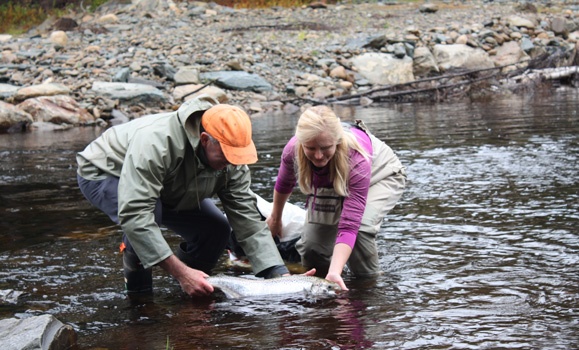News
» Go to news mainSaving Nova Scotia‚Äôs wild Atlantic salmon

Seeing the next generation of young ones enter the world after you have helped to raise them is always a profound experience, even when it is wild Atlantic salmon returning to the West River Sheet Harbour.
‚ÄúThat was one of the most exciting days ever,‚Äù says Audrie-Jo McConkey, a senior instructor with the Department of Animal Science and Aquaculture at –¬º”∆¬¡˘∫œ≤ ø™Ω±÷±≤•. ‚ÄúJust to see them back in their home environment and watch them splash about was a very powerful moment.‚Äù
It was a moment born of necessity. Over the years, the number of adult salmon returning from the ocean to West River to spawn had been dwindling. Low pH due to acid rain has been a major factor, compounded by negative changes in river flow and spawning habitat and mergansers preying on smolts in the estuary.
The pH levels were restored by adding vast quantities dolomitic limestone and the salmon’s environment was enhanced through the creation of deeper pools. Although these improvements increased smolt production, the number of returning maturing adults remained disconcertingly low.
“The Nova Scotia Department of Fisheries and Aquaculture proposed trapping some salmon smolts, rearing them to adults, and then releasing them back in the river to spawn,’ says Jim Duston, professor of finfish aquaculture with the Department of Animal Science and Aquaculture.
Having secured the necessary licenses and support, Duston and McConkey proceeded to rear two sets of smolts, one caught in 2017 and the second in 2018. It was an undertaking that posed considerable challenges. The smolts had to endure the stress of being transported to the campus by truck and then acclimating to fibreglass tanks. It also took great patience to convince the smolts to adapt to commercial food pellets.
“Initially we used freeze-dried krill dipped in cod liver oil, following advice from Beth Lenentine at Department of Fisheries and Oceans Coldbrook, and then we gradually weaned them onto a commercial pelleted diet” says McConkey, who handled most of the feeding and husbandry.
McConkey took care to ensure the tank provided a suitable rearing environment for the smolts. The water velocity was set at approximately one-and-a-half body lengths per second‚Äîwhich juvenile salmon prefer‚Äîand the fish‚Äôs endocrine systems were synchronized through a natural daylength cycle. Saprolegnia, a white fungus that is ubiquitous in fresh water sources, also posed problems when the fish were stressed, initially post-capture and later as they completed sexual maturation.¬Ý A one-hour saltwater bath treatment proved effective.
“Perhaps our greatest asset was our water quality,” Duston says. “We are sitting on a huge aquifer, which gives us an almost a limitless supply of 10-degree groundwater, with ideal pH levels, alkalinity and hardness. I think having that ideal water chemistry was a factor in our ability to rear these fish.”
It typically takes two years for West River smolts to reach sexual maturity, but some take an extra year. As a result, McConkey says they are still rearing some of the fish from the 2018 cohort, which will mature in fall 2021.
In fall 2020, Dr. Eddie Halfyard, a research scientist with the Nova Scotia Salmon Association, led a¬Ý preliminary survey near the release location. Although the wild and captive salmon could not be separated, the number of redds‚Äîgravel nests where salmon lay their eggs‚Äîobserved near the release site far exceeded observations in other stretches of the West River. This suggests that the released salmon are spawning near the release site, and that the Agricultural Campus fish rearing project was a success.
“What we saw could be the result of several factors such as lime dosing and restoration of the riverbanks,” McConkey says. “For those reasons, it may not be necessary to undertake an initiative like this again. But if we see the numbers begin to dwindle, we are ready to apply our skills and demonstrate how aquaculture can help ensure the sustainability of our wild stocks.”
Recent News
- MacRae Library Student Research poster competition
- Senator Colin Deacon recognizes Jolene MacEachern with King Charles III Coronation Medal
- AC graduates driving innovation and growth in the Dairy Industry with Lely North America
- Homecoming 2024 Photo Recap
- Hall of Fame inducts four new members
- 2024 Blue & Gold Awards presented
- Honouring Indigenous Knowledge: Community Food Systems in the Philippines
- Food Services Reading Week Hours ‚Äë November 11 ‚Äë 15, 2024.
